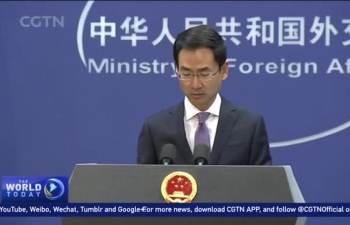WASHINGTON, May 12 (Xinhua) -- Chinese Ambassador to the United States Cui Tiankai said here Friday that the trade imbalance between China and the United States cannot and will not last in the long run.
Cui made the remarks at the panel discussion "Forty Years of U.S.-China Relations" hosted by the Center for Strategic and International Studies (CSIS), a policy research organization based in Washington, D.C.
The event, bringing together over 200 people from politics, business, academia and media, was held to discuss "the twists and turns in the relationship over the last four decades and the challenges that lie ahead," the CSIS said on its website.
China and the United States will mark the 40th anniversary of the establishment of their diplomatic relations next year.
CHINA WISHES U.S. CONTINUED ECONOMIC PROSPERITY
Since the economies of China and the United States are very interdependent, China sincerely hopes that the U.S. economy will continue to prosper, likewise, the United States has benefited from the development of the Chinese economy in the past four decades, Cui said.
As trade grows increasingly important in bilateral relations, Cui called for concerted efforts from China and the United States to find solutions to short-term problems first and explore way-outs to long-term and structural problems at the same time.
Speaking about the bilateral trade imbalance, Cui said that it would be one-sided and too simple to see a deficit as a loss and a surplus as a gain, rather, the two sides are better advised to take into consideration such issues as industrial chains, value chains and international division of labor.
The China-U.S. trade imbalance cannot and will not last in the long run, and the trade teams of the two nations are negotiating it, Cui said.
The ongoing trade consultations of the two nations cannot succeed when only one side's concerns are addressed, he said.
Negotiations based on mutual trust and a balanced approach can achieve their goals, Cui said, adding that serious commitments from both sides are required to reach agreements without the need for any deadlines.
"MADE IN CHINA 2025" INCLUSIVE
Cui said it is unnecessary for some Americans to fuss about the "Made in China 2025" plan, since all nations can join.
Introduced in 2015, the "Made in China 2025" plan was designed to upgrade the country's manufacturing industry. The 10-year national plan aims to promote development in 10 key sectors, including robotics, aerospace equipment and new materials.
The initiative is open to companies of all countries, including those of the United States, Cui said.
It is impossible for a country to lead in all areas forever, so long as the competition is fair, others countries will catch up as time passes by, Cui said.
Meanwhile, Cui said China has been increasing its awareness of and efforts on the protection of the intellectual property rights (IPR) problem in the past years, not only to address the concerns of the United States, but also to meet its own development needs.
China has listed IPR protection as one of the priority areas of its future opening-up, he said.
Cui also talked about a level playing field, an issue the Donald Trump administration has highlighted recently.
He said while U.S. enterprises complained it was unfair that Chinese companies were getting support from the government, their Chinese counterparts said the playing field is not level in the first place since U.S.-based multinationals boast first-mover advantages such as global supply chains, industrial lines, advanced experience and expertise, and the U.S. dollar as the international reserve currency.
CHINA TO CONTINUE REFORMS, OPENING-UP
The Chinese ambassador also said that his country will by all means ensure its own high-quality future development while continuing to open up.
China's reform and opening-up were successful, and there is no reason why it would not continue with further reforms and opening-up, Cui said, adding that China will roll out more measures to enhance its opening-up process.
He said that China's reforms have reached a challenging stage, and that China will remove various obstacles with greater wisdom and courage, so as to further promote its reform and opening-up process.













